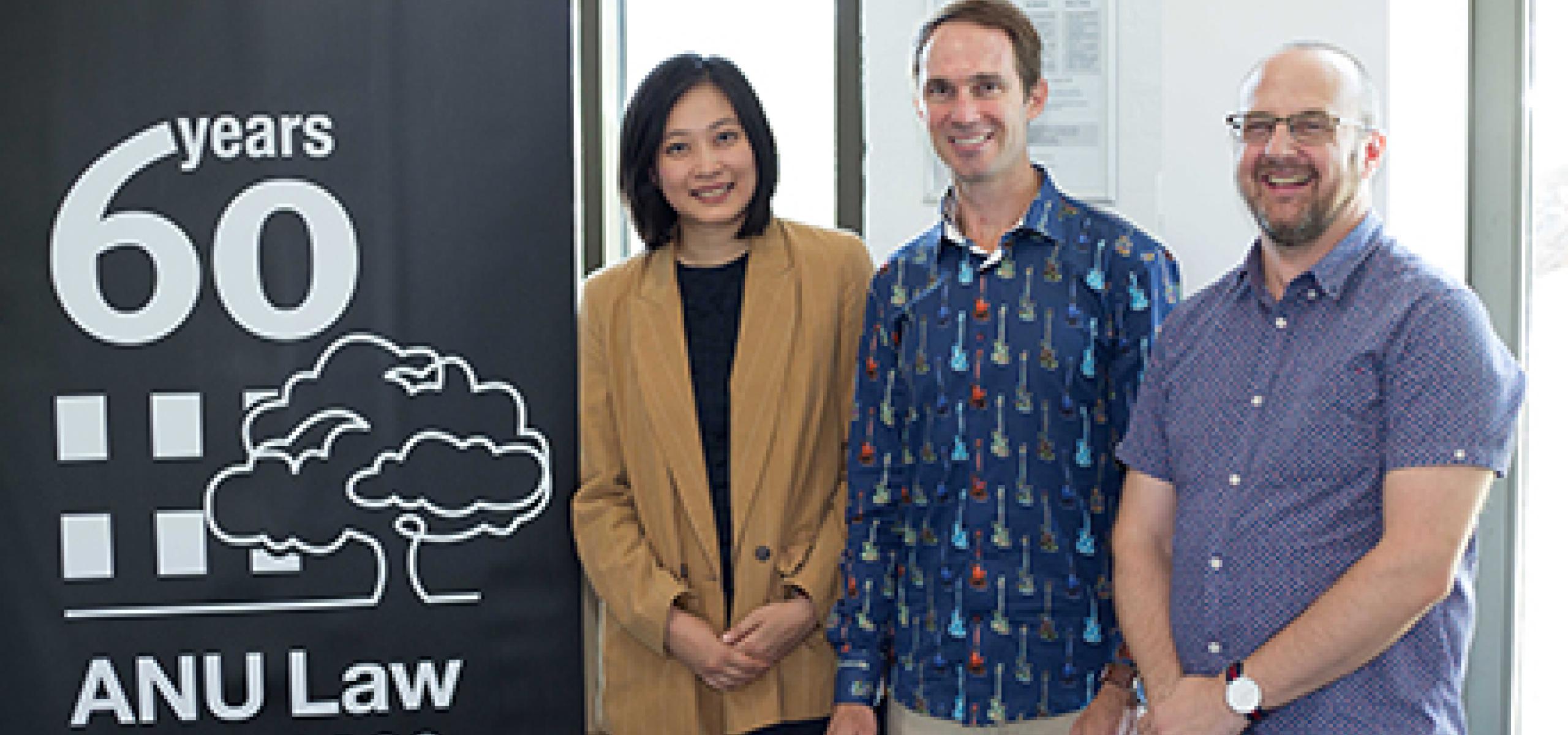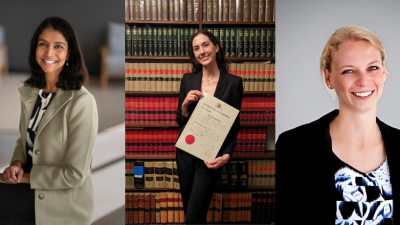
Thammasat University lecturer Thitirat Thipsamritkul (left) with Associate Professor Jolyon Ford (centre) and Professor Mark Nolan SFHEA.
We see ANU as the perfect university to expand our international cooperation because of its diverse expertise.
Thailand’s new Personal Data Protection Act (PDPA) will take effect in May 2020, subjecting organisations to new rules that safeguard the personal data of individuals. The law is modelled on the European Union’s General Data Protection Regulation (GDPR) and borrows many of its rules and requirements.
But how will it affect civil society? What does it tell us about legal reception? And can a market-driven law become a tool for human rights and democratisation?
These are some questions that intrigue Thitirat Thipsamritkul, a lecturer at Thammasat University in Bangkok. Ms Thipsamritkul, who recently concluded a seven-week fellowship at The Australian National University (ANU) College of Law, explored transnational standards in the context of the PDPA at a seminar on 30 January.
“It was brilliant,” said Ms Thipsamritkul, whose seminar was attended by ANU experts from various Colleges.
“The interaction with scholars from so many disciplines – political science, economics, anthropology, psychology, law, Thai studies – was very beneficial. I felt very comfortable talking to them. When it comes to talking to academics from different disciplines, it feels very natural and easy here.
“They asked many questions, offered useful comments and helped refine my research questions, methodologies and theories,” she added.
Thailand's new data protection law is similar to the EU's GDPR in many ways including its broad definition of personal data, extraterritorial applicability, and potentially harsh penalties for non-compliance. Photo: TheDigitalArtist via Pixabay.
Thammasat University is a partner institution in the National Law Schools Network (NLSN), an ANU Law-funded initiative that invites early career researchers, nominated by Deans at their home universities, to Canberra.
In addition to helping “internationalise” the careers of these researchers, the NLSN delivers on the University’s national responsibility to “deepen Australia’s understanding of, and role in, Asia and the Pacific”.
“The NLSN helps us to build school-to-school staff links, and is intended to become part of our longer-term strategy to strengthen our research impact and cooperation with law schools in the region,” said Associate Dean (International), Dr Jolyon Ford.
“In 2020, we look forward to welcoming other accomplished academics from national law schools in India, Indonesia, Malaysia and Vietnam.”
Ms Thipsamritkul, who teaches public international law, human rights law, media law, and law and technology at Thammasat University, said the benefits of her visit extended beyond her personal research.
“I wanted to contribute to the relationship between the ANU College of Law and Thammasat University. We see ANU as the perfect university to expand our international cooperation because of its diverse expertise across law and many other disciplines,” she explained, adding that she engaged in discussions with ANU Law scholars about curriculum revision, student activities and strategies for building a “knowledge-sharing community”.
Thitirat Thipsamritkul, a lecturer at Thammasat University, was a visiting scholar at ANU as part of the National Law Schools Network.
Nevertheless, one of the biggest highlights of her time at ANU was advancing her research into the influence of the GDPR on the law in Thailand. It becomes the latest Southeast Asian nation to adopt personal data protection laws, joining Singapore, Malaysia and the Philippines.
In addition to the timeliness of her research, Ms Thipsamritkul noted that Thailand’s PDPA offers an interesting case study of various legal concepts.
“This phenomenon is something I would like to examine possibly from the perspective of legal imperialism or legal reception, especially the adoption of Eurocentric rules in a non-Western jurisdiction,” she said.
“The underlying principles are dignity, privacy, and freedom of expression. These fundamental human rights values are not well established in many non-Western jurisdictions. There are, of course, constitutions and ratified international treaties, but the way we think about these concepts can differ from the Eurocentric or US approach.”
Following her seminar, Ms Thipsamritkul took questions from ANU scholars about her research questions and methodologies. The interdisciplinary support she received was both “validating and a great relief”, she said.
“It confirmed my project is of significance,” she noted.
“Academia can be lonely work, fighting inside one’s head. So it was really encouraging to receive positive and constructive feedback.”
Words and pictures by Tom Fearon/ANU




